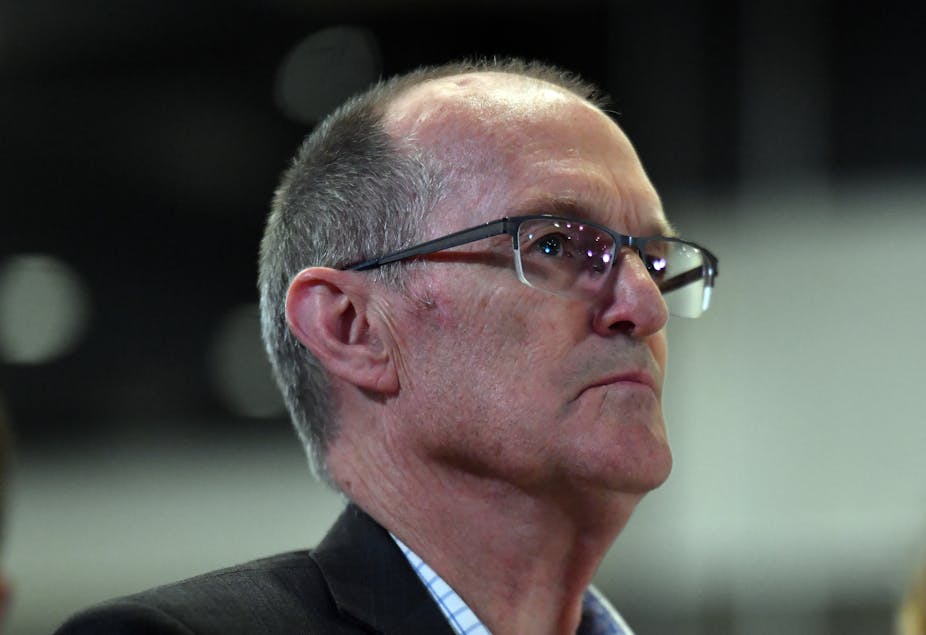When he announced the result of the review by his departmental secretary Phil Gaetjens into Bridget McKenzie’s conduct, Scott Morrison was very clear. Gaetjens’ report was a cabinet document and it wouldn’t be made public.
Morrison just quoted from Gaetjens’ findings. The essence of these are that while the then sports minister had breached the ministerial standards by failing to disclose her membership of gun organisations, her allocation of grants wasn’t politically skewed.
“He said, ‘I find no basis for the suggestion that political considerations were the primary determining factor,’” according to Morrison.
Given this was totally at odds with the Audit Office conclusion of a bias towards marginal and targeted seats, Morrison’s failure to produce the Gaetjens’ report potentially harms the credibility of his most senior public servant.
We need to see the detail of Gaetjens’ argument that the Auditor-General was wrong about the grants being skewed. The report from the Audit Office – a respected, expert and politically neutral body - is very detailed in its information. A senior bureaucrat rejecting it would be expected to have strong, well-argued grounds. How did Gaetjens come to his conclusions on this matter?
Morrison produced a couple of statistics from Gaetjens but they hardly refuted the Audit case.
Gaetjens had looked at the grants rounds “in their entirety”, Morrison noted. But what was his justification for focusing on the entirety, when McKenzie’s allocations became blatantly more political as time went on?
And is there nuance in Gaetjens’ statement that political considerations weren’t the “primary” factor?
Read more: Remembrance of rorts past: why the McKenzie scandal might not count for a hill of beans
Gaetjens’ was an awkward position even before Morrison drew him into the McKenzie imbroglio.
Formerly Morrison’s chief of staff, he was appointed first to head treasury when Morrison was treasurer and then brought over to lead the Department of Prime Minister and Cabinet.
While contemporary PMs like to have their own man (there has not been a woman) as their department head, Gaetjens was seen, more than most, as a “political” appointment, despite his quite extensive bureaucratic background.
Public servants could (and did) reasonably ask, as leader of the public service, was he likely to stand up for their interests?
They might have had their fears heightened after Morrison chopped off a bunch of senior heads before Christmas.
Because of their personal closeness, Morrison’s asking Gaetjens to investigate McKenzie was inevitably placing the secretary in a very hot place.
It was clear, as the publicity over McKenzie intensified, that whatever Gaetjens found would determine her fate. Morrison had effectively said so.
Further, Gaetjens was investigating against a background of two factors. McKenzie had become a serious political liability. Yet the government had dug in to defend her funding allocations.
Read more: The 'sports rorts' affair shows the need for a proper federal ICAC – with teeth
Former public service commissioner Andrew Podger says Gaetjens “was the wrong person to have asked [to do the inquiry] and I’m surprised by his advice as reported by the PM”.
The timing of Gaetjens’ presentation of the report worsened the optics.
On January 22, Morrison’s office announced he’d asked Gaetjens to look into whether McKenzie had breached ministerial standards.
In the normal course of events one would have thought Gaetjens would have finished his work by, say, the end of the Australia Day long weekend. The material and the minister were at hand; it was not an excessively complicated exercise for someone who’s had plenty of experience of working quickly.
Morrison told his Sunday news conference he received Gaetjens’ report late Saturday night - which did seem an odd time to present a report - inviting speculation of sequenced choreography.
Morrison previously had been able to say he hadn’t received the report. But had he been briefed on it by Gaetjens?
Morrison’s office has produced a list of precedents of when probes into ministerial conduct were not released (a 2019 letter from then departmental secretary Martin Parkinson to the PM on whether former ministers Pyne and Bishop had breached standards was provided to the Senate in response to a Senate order).
But if the PM continues to hide behind cabinet confidentiality and precedent, it won’t just be his skin that sustains bruises, but that of his right hand bureaucrat. And anyway, there is always the prospect of a Senate order, and the certainty of Senate estimates hearings.
Updated 5 February 2020
Senate tells government to produce Gaetjens report and establishes inquiry into sports affair
The Senate on Wednesday established an inquiry into the sports rorts affair, and also called on the government to table the Gaetjens advice.
The select committee will have a remit to investigate if Scott Morrison’s office had any role in the grants allocation.
Its terms of reference cover:
program design and guidelines
requirements placed on applicants for funding
management and assessment processes
adherence to published assessment processes and program criteria
the role of the offices of the minister, the prime minister and deputy prime minister, and any external parties, in determining which grants would be awarded and who would announce the successful grants.
The committee is to report by March 24. It will have two senators appointed by the government, two selected by the opposition and one from the Greens.
Apart from calling for the Gaetjens report, the Senate has called on the government to produce the advice the Attorney-General, Christian Porter, gave on the legal authority of then sports minister Bridget McKenzie to make decisions on the grants, a colour coded spreadsheet used in the minister’s office, and communications between ministerial offices including the prime minister’s office.

